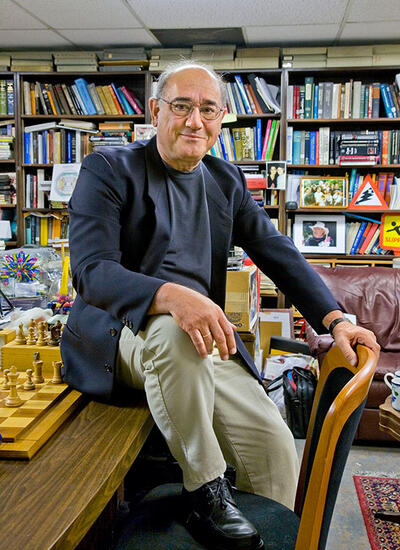We are sorry to share the sad news of the passing of a beloved colleague and prolific scholar, Alexander (Alex) Pines, Glenn T. Seaborg Professor Emeritus and Professor of the Graduate School. He was 79 years old.
Alex was born in 1945 and grew up in Rhodesia (now Zimbabwe), where his lifelong passion for science, music, and chess was fostered. He studied mathematics and chemistry at the Hebrew University of Jerusalem, graduating with a B.Sc. in 1967. In 1968, Alex began his doctoral studies at MIT and obtained his Ph.D. in chemical physics in 1972. He then joined the Berkeley faculty as an assistant professor that same year. Alex rose through the ranks of the professoriate. He was promoted to Associate Professor in 1975 and to Professor in 1980. In addition, Alex was a Senior Scientist in the Materials Sciences Division at the Lawrence Berkeley National Laboratory, contributing to DOE programs over four decades. He retired in 2017 but remained active in research, education, and fundraising for the college as professor of the graduate school.

Alex was a pioneer in the development and applications of nuclear magnetic resonance (NMR) spectroscopy, originally in solid-state NMR. Together with John S. Waugh, he demonstrated time-reversal of dipole-dipole couplings in many-body spin systems, and introduced cross polarization and high-resolution NMR (proton-enhanced nuclear induction spectroscopy) of dilute spins such as carbon-13, nitrogen-15 and silicon-29 in solids, thereby helping to launch the era of modern solid-state NMR in chemistry. Through the art and practice of chemistry, Alex made the impossible possible and laid the groundwork for more advancements to come. In 2023, thanks to a very generous philanthropic investment, the Pines Magnetic Resonance Center was launched in his honor in the College of Chemistry.
Over his career, Alex received numerous awards and honors. He was a recipient of the Wolf Prize in Chemistry, a member of the U.S. National Academy of Sciences, a foreign member of the Royal Society and a renowned teacher, who was recognized with the campus’s Distinguished Teaching Award, the highest achievement for teaching at Berkeley.
Alex inspired and touched us all with his brilliance and charm. He never stopped innovating, and he encouraged all around him to do the same. Please join me and the hundreds of self-dubbed “Pinenuts” who have passed through Alex’s laboratory in remembering our remarkable colleague and friend and his immeasurable contributions to our community and beyond. He will be greatly missed.